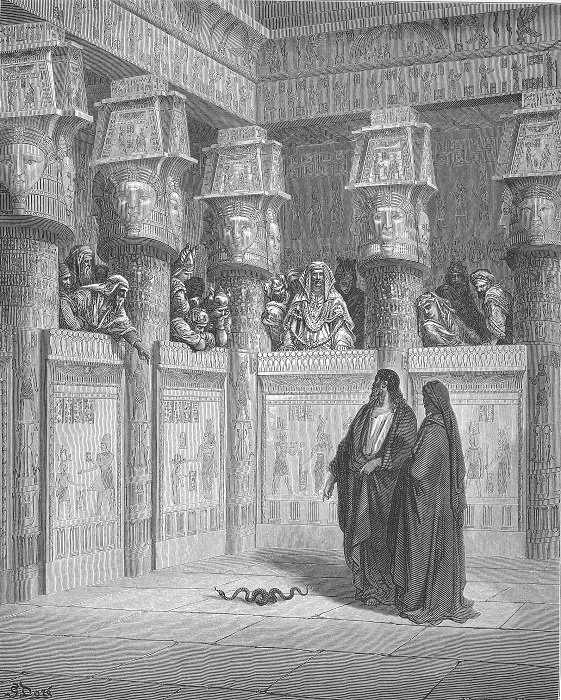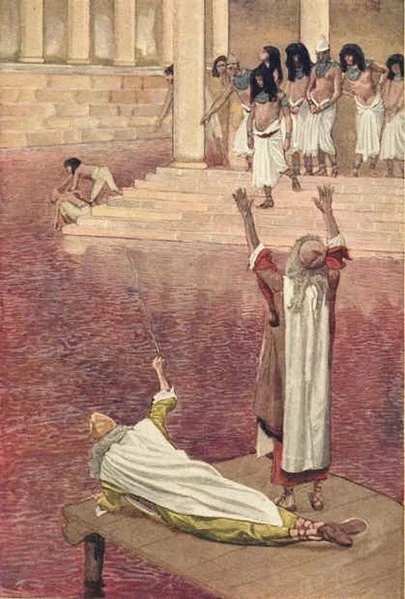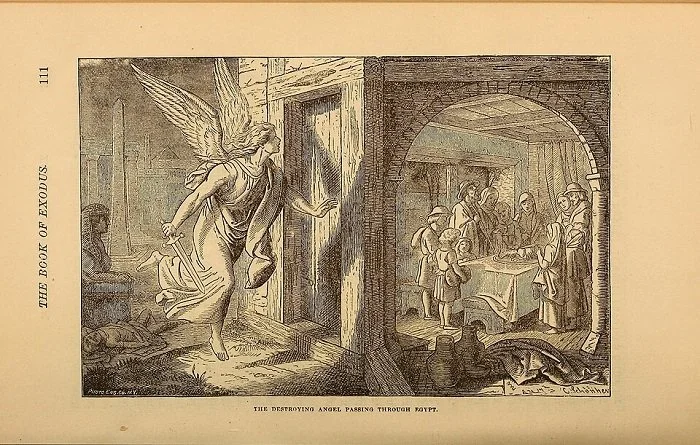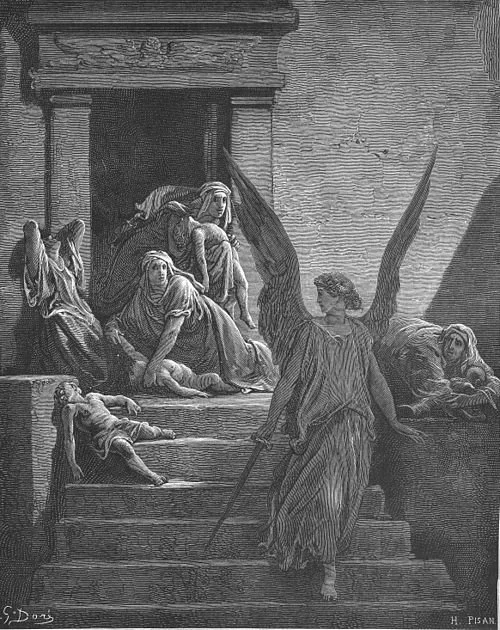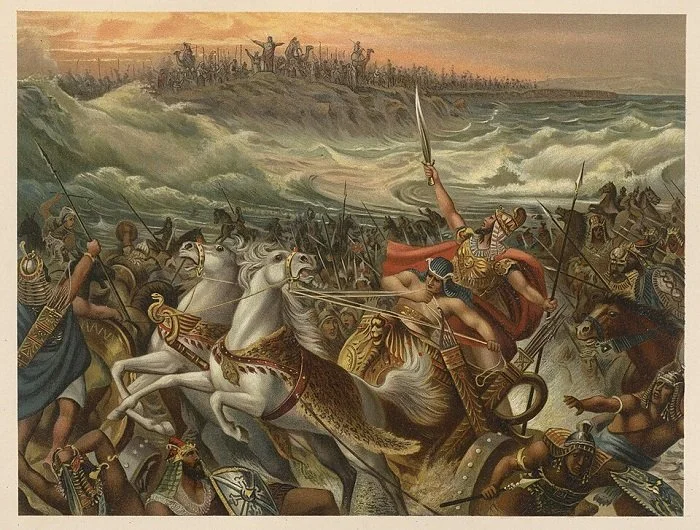Bible Study Notes - Exodus Chapters 7-14: The Ten Plagues of Egypt and the First Passover
‘Scripture taken from the New King James Version. Copyright © 1982 by Thomas Nelson. All rights reserved.’
At the time of confronting Pharaoh, Moses was 80 years old and Aaron, 83.
The recurring phrase in these chapters is: ‘“know that I am the Lord”’.
The Lord warned Moses and Aaron that when they spoke to Pharaoh, he would want to see a miracle, and the Lord told them what they were to do. (7:8)
When it happened as the Lord said, ‘Aaron cast down his rod before Pharaoh… and it became a serpent.’ (7:10)
Moses and Aaron before Pharaoh by Gustave Dore (W.Commons)
In response, Pharaoh told his ‘wise men and the sorcerers’ to do the same, and their rods became serpents; ‘But Aaron’s rod swallowed up their rods.’ (7:11, 12)
With Pharaoh refusing to relent, the plagues began.
But God did not strike the people first; He was gracious with the severity of the plagues, each time giving Pharaoh a chance to relent, to repent.
Something I didn’t notice the first couple of readings is that each of the plagues was targeted against one of Ancient Egypt’s gods, underlining the fact that idols have no power for they are inanimate objects, fashioned by man’s hand.
These two sites explain the meaning of the ten plagues and the Egyptian gods they defeated.
The first plague – waters become blood:
‘Thus says the Lord: “By this you shall know that I am the Lord… I will strike the waters which are in the river with the rod that is in my hand, and they shall be turned to blood.”’ (7:17, 18)
Water is changed into blood by James Tissot (W.Commons)
The second plague – frogs overrun the land:
Moses gave the Lord’s message to Pharaoh: ‘“Let My people go, that they may serve Me. But if you refuse to let them go, behold, I will smite all your territory with frogs… which shall… come into your house… into your ovens, and into your kneading bowls.”’ (8:1-3)
Pharaoh instructed his magicians, as he’d done before, to do the same as Aaron had done in a bid to prove there was no God, but the magicians only made things worse as all they could do was copy, not eradicate God’s work.
Pharaoh told Moses and Aaron to ‘“Entreat the Lord that He may take away the frogs from me and from my people; and I will let the people go, that they may sacrifice to the Lord.”’ (8:8)
But, instead of asking them to intercede immediately, he told them to do it the next day; was he hoping something else would happen, freeing him from having to acknowledge God’s power?
Yet, when relief from the frogs came, Pharaoh did not keep his word.
The third plague – lice on man and beast:
The Lord told Moses to tell Aaron to ‘“Stretch out your rod, and strike the dust of the land, so that it may become lice throughout all the land of Egypt.”’ (8:16)
This time, Pharaoh’s magicians came to an amazing conclusion when they failed: ‘“This is the finger of God.”’ (8:19)
The fourth plague – swarms of flies:
Again, the Lord said, ‘“Let My people go, that they may serve Me. Or else… I will send swarms of flies on you… on your people and into your houses… And in that day I will set apart the land of Goshen, in which My people dwell, that no swarms of flies shall be there… that you may know that I am the Lord…”’ (8:20-22)
The fifth plague – a pestilence on livestock:
The Lord’s message to Pharaoh if he refused to let God’s people go: ‘“… the hand of the Lord will be on your cattle… on the horses, on the donkeys, on the camels, on the oxen, and on the sheep – a very severe pestilence. And the Lord will make a difference between the livestock of Israel and… of Egypt. So nothing shall die of all that belongs to the children of Israel.”’ (9:2-4)
Despite the deaths of the livestock of his people, Pharaoh still refused to relent and let the Israelites go.
The sixth plague – boils and sores on man and beast:
As painful as this was, still Pharaoh would not heed Moses and Aaron.
The seventh plague – hail and fire:
When the Lord announced this plague, he also gave warning to the Egyptians to bring their livestock in from the field to protect them from the severe hail, for any left in the field would die.
When this grace was shown to the Egyptians, some responded positively, proving they understood Moses’ God was the true God.
‘Moses stretched out his rod toward heaven; and the Lord sent thunder and hail, and fire darted to the ground.’ (9:23)
Seventh Plague of Egypt by John Martin (W.Commons)
Pharaoh then made a confession of sorts: ‘“I have sinned this time.”’ (9:27); that he added “this time” called into question the authenticity of his confession, which Moses must have been aware of for he said, ‘“I know that you will not yet fear the Lord God.”’ (9:30)
The eighth plague – locusts:
Before God sent the locusts, He said to Pharaoh, via Moses and Aaron: ‘“How long will you refuse to humble yourself before Me?”’ (10:3); God challenged him to reconsider and obey, giving Pharaoh the opportunity to save his people and his land.
Even Pharaoh’s servants pleaded with him to let the Israelites go to serve their God and thus spare them.
But, instead of allowing all the Israelites to go into the wilderness to serve God, Pharaoh would only allow the men to go; they had to leave their families behind, basically as hostages to guarantee their return.
As the locusts ravaged the land, again, Pharaoh pleaded to have his sins forgiven – ‘“… please forgive my sin only this once… that He may take away from me this death only.”’ (10:17); again, his plea was a dishonest one, proved by the phrases, ‘only this once’, and ‘this death only’.
The ninth plague – darkness for three days:
‘The Lord said to Moses, “Stretch out your hand toward heaven, that there may be darkness over the land of Egypt, darkness which may even be felt.”’ (10:21)
While the land was covered in thick darkness, the children of Israel were, once again, spared.
This time, when Pharaoh agreed to let them go and serve God, he wouldn’t allow them to take any livestock.
When Moses insisted that they needed the livestock for the sacrifice, Pharaoh, angered, ordered him out: ‘“Get away from me! Take heed to yourself and see my face no more! For in the day you see my face you shall die!”’ (10:28)
And Moses replied, ‘“I will never see your face again.”’ (10:29); that marked the end of all negotiations.
Before the Lord explained the tenth and last plague, he told Moses to tell the Israelites to ask their neighbours for ‘articles of silver… and gold’; the Egyptians gave generously for they respected Moses. (11:2, 3)
The Lord’s message for Pharaoh: ‘“About midnight, I will go out into the midst of Egypt; and all the firstborn in… Egypt shall die, from the firstborn of Pharaoh… to the firstborn of the female servant… and all the firstborn of the animals… But against none of the children of Israel… that you may know that the Lord does make a difference between the Egyptians and Israel.”’ (11:4-7)
The Lord then told Moses, ‘“This month shall be your beginning of months… the first month of the year to you.”’ (12:2)
The month, Abib (it would become Nisan), which corresponds to March/April, not only marked the start of their religious calendar, but also the start of Israel as a nation.
The Lord then went on to detail what they were to do to protect themselves from the tenth plague, which was the establishment of the Passover.
The preparation began with a ‘“lamb… without blemish, a male of the first year… keep it until the fourteenth day of the same month. Then… kill it at twilight. And… take some of the blood and put it on the two doorposts and on the lintel of the houses where they eat it.”’ (12:5-7)
The Lord then laid out how to prepare and cook the meat, how to eat it and what to do with the remains; ‘“thus you shall eat it: with a belt on your waist, your sandals on your feet, and your staff in your hand. So you shall eat it in haste. It is the Lord’s Passover.”’ (12:11)
Why did they have to mark their doorposts with blood?
Because the Lord Himself would ‘“pass through the land of Egypt… and will strike all the firstborn in the land of Egypt… I am the Lord… the blood shall be a sign for you… when I see the blood, I will pass over you…”’ (12:12, 13)
The Destroying Angel Passing Through Egypt from The Story of the Bible by Charles Foster (W.Commons)
Prayer and fasting were not enough to save the people from the Lord’s judgement against Egypt. The blood sacrifice of the lamb, its life given on behalf of others, was the core of sparing the Israelites.
The tenth plague – death of the firstborn:
‘… at midnight… the Lord struck all the firstborn in the land of Egypt… and there was a great cry in Egypt, for there was not a house where there was not one dead.’ (12:29, 30)
The Firstborn of the Egyptians are Slain by Gustave Doré (W.Commons)
Why were the firstborn struck down? Because years before, Pharaoh had ordered the firstborn sons of the Israelites to be killed. (1:16, 22)
Finally, Pharaoh told Moses and Aaron to take their people and go, and the Egyptians also urged the people to go. (12:31, 32)
The Israelites Leaving Egypt by David Roberts (W.Commons)
When the Israelites left Egypt, ‘God led the people around by way of the wilderness of the Red Sea… And Moses took the bones of Joseph with him… And the Lord went before them by day in a pillar of cloud… and by night in a pillar of fire…’ (13:18, 19; 21)
Back in Egypt, in a quick turnaround from grieving for the loss of their firstborns, Pharaoh and his servants regretted letting their slaves, the Israelites, go.
Pharaoh ‘took six hundred… chariots… with captains over every one of them… and pursued the children of Israel.’ (14:7, 8)
When the Israelites saw Pharaoh’s experienced troops and chariot force approaching, they feared for their lives for they had no military experience.
Moses reassured them, telling them not to be afraid, to ‘“stand still, and see the salvation of the Lord… The Lord will fight for you…”’ (14:13, 14)
And the Lord told Moses to ‘“lift up your rod, and stretch out your hand over the sea and divide it. And the children of Israel shall go on dry ground through the midst of the sea… I will gain honour over Pharaoh and over all his army… Then the Egyptians shall know that I am the Lord…”’ (14:16-8)
Then ‘the pillar of cloud went from before them and stood behind them… between the camp of the Egyptians and the camp of Israel.’ (14:19, 20); the Lord went from leading to protecting them.
And it happened as the Lord said, the sea parted and the Israelites ‘went into the midst of the sea on the dry ground, and the waters were a wall to them on their right hand and on their left.’ (14:22)
Moses and the Children of Israel Crossing the Red Sea c.1855 by Henri Frédéric Schopin (W.Commons)
The Egyptians pursued them and were still traversing the dry seabed when the Israelites reached the other side.
At God’s command, Moses raised his rod again and ‘the sea returned to its full depth… the Lord overthrew the Egyptians in the midst of the sea.’ (14:28)
The Golden Bible of the Classics - The History of Divine Revelation in the Old and New Testaments. Vol. 1 (W.Commons)
‘Thus Israel saw the great work which the Lord had done in Egypt; so the people feared the Lord, and believed the Lord and His servant Moses.’ (14:31)
Before I end this, I’d like to share a wonderful explanation about a phrase (and similar phrases) that used to confuse me; it’s when God says, ‘“… that My name may be declared in all the earth.”’ (9:16), variations being ‘“for His name’s sake”’ (Psalm 23:3), ‘“I will sanctify My great name”’ (Ezekiel 36:23)
I used to wonder if that meant God was using us simply to make Himself great, which, of course, is not the case, but I struggled to come up with a coherent explanation.
But, just in time for this blog post, I came across a great explanation by John Piper, taken from his book, ‘The Pleasures of God’; bear in mind, before the Exodus, not even the Israelites knew God’s name until God revealed it to Moses at the burning bush:
“The deepest reason given for God’s commitment to His people is His prior commitment to His own name. The rock-bottom foundation of our forgiveness and our fearlessness and our joy is the commitment of God to His own great name… The point of the Exodus was to make a worldwide reputation for God… to demonstrate the astonishing power of God on behalf of His freely chosen people, with the aim that this reputation, this name, would be declared throughout the whole world.”
